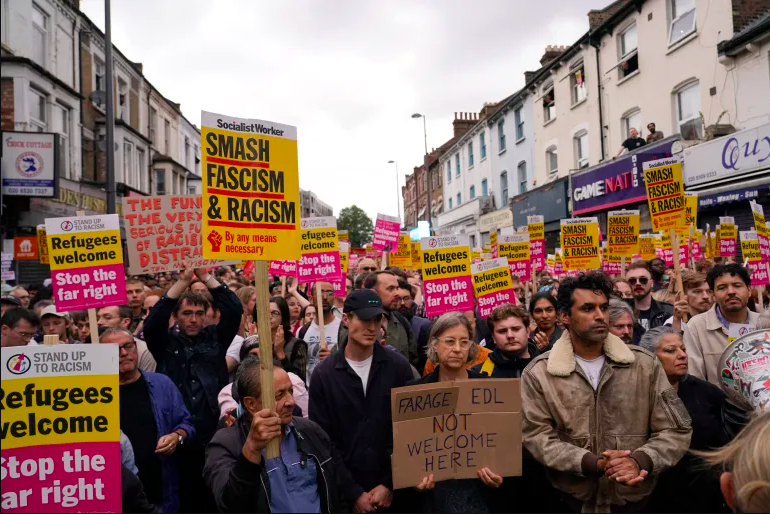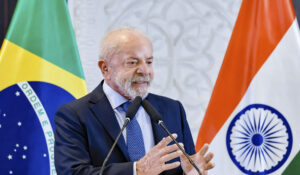
Published 08/08/2024 16:49 | Edited 08/08/2024 16:55
On Wednesday night (7), thousands of anti-racist protesters gathered in several cities in England, in response to the recent violent protests promoted by radical right groups. The demonstrations took place in London, Brighton, Southampton, Bristol, Birmingham, Newcastle and other locations, and, despite concerns about possible clashes, most of the acts took place peacefully.
The anti-racism protests have emerged in response to a wave of violence that has swept England over the past week, sparked by far-right groups following the murder of three young girls in Southport, in the northwest of the country. The stabbing attack sparked a series of riots, during which far-right groups have used the incident to target non-white and immigrant communities. In some cases, the protests have escalated into violent clashes with police and attacks on hotels housing asylum seekers.
Authorities deployed extra police to prevent anti-racism demonstrations from turning violent. Scotland Yard chief Mark Rowley hailed the night as a “success”, noting that fears of disorder had been largely averted. In London, where 1,300 officers were deployed, Mayor Sadiq Khan expressed his gratitude to the peaceful protesters and the police force, reaffirming the city’s stance against racism and Islamophobia.
Responding to disinformation and political backlash
The context of the protests was exacerbated by misinformation about the suspect in the Southport attack. Unfounded rumours about his identity, amplified by far-right influencers, incited violence and hostility. Stephen Yaxley-Lennon, known as Tommy Robinson, was a key disseminator of this misinformation.
British Prime Minister Keir Starmer condemned the actions of radical right groups, describing them as “savagery”. The disinformation and attacks have been widely criticized by experts and observers, who highlight the harmful role of the radical right in polarizing and increasing social tensions.
International and local concerns
The rise in violence has prompted warnings from countries including India, Nigeria and Malaysia for their citizens travelling to the UK, and the Foreign Ministry has recommended precautions for Brazilians living in the country. Concerns about immigration levels, widely debated in the July general election and fuelled by figures such as Nigel Farage, have also contributed to the climate of tension and discontent.
Despite the presence of groups like Patriotic Alternative, which have organized anti-immigrant protests, the violent response to the Southport attacks has united radical right factions in an unprecedented way. Lizzie Dearden, an author and terrorism expert, noted that the internal fragmentation of the radical right has been temporarily overcome by the current crisis.
Future challenges and security measures
Violence targeting mosques and asylum seeker hotels, particularly in places like Aldershot, highlights the continued need for vigilance and security measures. Reports of protesters attacking properties and making threats reinforce the urgency of a balanced approach to tackling extremism and protecting vulnerable communities.
Wednesday’s anti-racism protests demonstrate a strong commitment to justice and equality in the face of right-wing extremism. However, violence and misinformation continue to pose significant challenges to social cohesion and public safety in the UK. Government and local authorities will need to remain vigilant and proactive to ensure safety and promote inclusion in an increasingly divided society.
Source: vermelho.org.br

